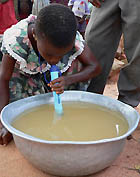A Swiss company is donating its ingenious water filter to impoverished villagers in western Kenya while also turning a handsome profit. Making money while giving away your products is counterintuitive, but it is working. If developed to scale, this business model could be a game-changer for developing countries.
Mikkel Vestergaard Frandsen is the 38-year old CEO of a family company that has made work clothes and disaster supplies for more than 50 years. Water filters are a new addition to the product line.
The company’s first water filter, Lifestraw, was designed for individuals to carry with them. It was followed by a larger, easy-to-use model for families. Pour dirty water in the top, and clean water comes out at the bottom. So clean, it meets EPA standards for drinking water.
Initially, Frandsen relied on donations and government support to pay for the filters, however, the 2008 recession meant he had to find other funding. As he was casting about for elusive financing, carbon credits came to mind, and Frandsen connected the dots between firewood and clean water.
Typically villagers in Kenya purify their water by boiling it over a fire. With Lifestraw, they no longer have to burn firewood, and by burning less wood, they reduce their carbon emissions—all of which qualifies Frandsen for carbon credits now being sold by J.P. Morgan.
The reduction in carbon emissions must be documented for certification purposes, thus the company has hired 4,000 community health workers and 4,000 drivers to distribute the filters, teach families how to use them, and photograph each site. Hundreds of other workers will be hired to build repair centers and check homes to make sure the filters are being used. The filters can clean 18,000 liters of water, which is the average amount needed for a family of five for three years.
In addition to clean water and carbon offsets, the company reports that it has provided thousands of new jobs and improved the health of women who suffer from respiratory diseases connected to the smoke from indoor fires.
Frandsen invested $30 million in the water filter project. The company is now earning 2 million carbon credits a year that can trade from $6 to $12 each. With a 10-year commitment to repairing and replacing the water filters, Frandsen’s company stands to make its investment back many times over and do a world of good.



